Text
Taboo vocabulary in English, French and Spanish
These are some words you might not learn in class or in your textbooks but that are useful anyway. As always, feel free to tell me if I made any mistake and to add new words and/or languages in the notes :)
Death - La mort - La muerte
Dead - Mort(e) - Muerto/a
A corpse - Un cadavre - Un cadáver
Grieth - Le deuil - La pena
To be grieving - Être en deuil - Estar de luto
A coffin - Un cerceuil - Un ataúd
A funeral - Un enterrement - Un funeral
A cemetery - Un cimetière - Un cementerio
Illness - La maladie - La enfermedad
Terminal illness - Maladie terminal- Enfermedad terminal
Cancer - Cancer - Cáncer
A tumor - Une tumeur - Un tumor
HIV - VIH - VIH
AIDS - SIDA - SIDA
Epilepsy - Epilepsie - Epilepsia
Epileptic - Epileptique - Epiléctico
Hancicap - Le handicap - La discapacidad
A wheelchair - Un fauteuil roulant - Una silla de ruedas
Amputated - Amputé(e) - Amputado/a
An amputation - Une amputation - Una amputación
Deaf - Sourd(e) - Sordo/a
Blind - Aveugle - Ciego/a
Mute - Muet(te) - Mudo/a
A mental illness - Une maladie mentale - Una enfermedad mental
Trisomy - Trisomie - Trisomía
Alzheimer’s disease - Alzheimer - Alzheimer
A depression - Une dépression - Una depresión
To be depressed - Être dépressif/déprimé - Estar deprimido
Anxiety - Anxiété - Ansiedad
Bipolar - Bipolaire - Bipolar
Anorexia - Anorexie - Anorexia
Anorexic - Anorexique - Anoréxico/a
Bulimia - Boulimie - Bulimia
Bulimic - Boulimique - Bulimico/a
Sex - Le sexe - El sexo
A condom - Un préservatif - Un condón
To make love - Faire l’amour - Hacer el amor
Foreplay - Préliminaires - Preliminares
Fellatio - Fellation - Felación
Sodomy - Sodomie - Sodomía
Sexuality - La sexualité - La sexualidad
Heterosexual - Hétérosexuel - Heterosexual
Homosexual - Homosexuel - Homosexual
Bisexual - Bisexuel - Bisexual
Pansexual - Pansexuel - Pansexual
Asexual - Asexuel - Asexual
Aromantic - Aromantique - Aromántico
Cisgender - Cisgenre - Cisgénero
Trangender - Transgenre - Transgénero
Periods - Les règles - La menstruación
Sanitary pad - Serviette - Compresa / toalla femenina
A tampon - Un tampon - Un tampón
Uterus - Uterus - útero
Cramps - Crampes - Calambre
Pain - Douleur - Dolor
Blood - Sang - Sangre
A stain - Une tache - Una mancha
Poop - Le caca - La caca
Piss - Le pipi / la pisse - Meo / pis
Toilets - Les toilettes - Los baños
To flush - Tirer la chasse - Descargar
Shit - La merde - La mierda
Diarrhea - La diarrhée - La diarrea
Constipation - Constipation - Estreñimiento
Drugs - Les drogues
LSD - LSD - LSD
Marijuana - Marijuana - Marihuana
Heroin - Heroïne - Heroína
Cocaine - Cocaïne - Cocaína
Dealer - Traficant / dealer - Traficante
To inject - Se piquer - Inyectar
Needle - Seringue - Aguja
Overdose - Overdose - Sobredosis
Religion - La religion - La religión
Catholic - Catholique - Católico
Catholicism - Catholicisme - Catolicismo
The Pope - Le Pape - El Papa
A priest - Un prêtre - Un sacerdote
A church - Une église - Una iglesia
Islam - Islam - Islam
Muslim - Musulman - Musulmán
An imam - Un imam - Un imán
A mosque - Une mosquée - Una mezquita
A jew - Un juif / une juive - Un judío
Judaism - Judaïsme - Judaísmo
A temple - Un temple - Un templo
A sinagogue - Une synagogue - Una sinagoga
Buddhism - Bouddhisme - Budismo
Buddhist - Bouddhiste - Budista
Hinduism - Hindouisme - Hinduismo
Hindu - Hindouiste - Hinduista
Atheist - Athée - Ateo
Agnostic - Agnostique - Agnóstico
A veil - Un voile - Un velo
A hijab - Un hijab / un voile islamique - Un hiyab
A cross - La croix - Una cruz
A star - Une étoile - Una estrella
War - La guerre - La guerra
A soldier - Un soldat - Un soldado
An army - Une armée - Un ejército
Arms - Armes - Armas
A gun - Un fusil - Un fusil
A bombing - Un attentat - Un atentado
A bomb - Une bombe - Una bomba
Refugee - Refugié(e) - Refugiado/a
To shoot - Fusiller - Fusilar
Death penalty - Peine de mort - Pena capital
Poverty
To be poor - Être pauvre - Ser pobre
To beg - Mendier - Mendigar
Beggar - Mendiant(e) - Mendigo/a
Refuge - Refuge - Refugio
Squat - Squat - Casa okupa / invasión
Homeless person - Sans-abris / SDF (sans domicile fixe) - Persona sin hogar / vagabundo
Slum - Bidonville - Barrio pobre / suburbio
Ghetto - Cité / Ghetto - Gueto
2K notes
·
View notes
Text
french travel vocabulary

voyager - travel
le train - the train
l’avion - the plane
le bus - the bus
le billet - the ticket
l’aéroport - the airport
la gare - the train station
le passeport - the passport
le portefeuille - the wallet
un aller simple - a one-way ticket
un aller et retour - a round-trip ticket
arriver - arrive/land *
partir - depart *
les bagages - the luggage
le touriste - the tourist
les vacances - the vacation
le métro - the subway (underground/metro)
l’hôtel - the hotel
la plage - the beach
le café - the café
le restaurant - restaurant
le marché - market
le taxi - the taxi
le vélo - the bicycle
useful phrases
merci beaucoup - thank you so much
où est [le métro]? - where is [the metro]?
où se trouvent les toilettes? - where is the restroom/bathroom?
je voudrais [une baguette], s’il vous plaît - i would like to have [a baguette], please
où puis-je acheter [des croissants]? - where can i buy [some croissants]?
je parle un peu français - i speak a little french
je parle pas français - i don’t speak french
[changeable] ! please correct me if i’m wrong !
*these are action verbs, which means they are conjugated a bit differently :)
Keep reading
2K notes
·
View notes
Text
Masterpost of Followers of Hellenic Deities
This is the masterpost of follower lists for the deities of the Greek Pantheon. If you would like to be added to any list please either comment on the post featuring the list(s) you would like to be added to or shoot me an ask stating which lists you’d like to be added to and the name of the blog if it isn’t the one you’re using. If your deity does not appear on this masterpost please send me an ask or message and I will be happy to make them one! ALL deities and figures from the Greek Pantheon are welcome on this list!
Any problems, corrections, or changes please feel free to message me!
Achilles
Adonis
Akeso
Alala
Alexander the Great
Amphitrite
Antheia
Antinous
Aphrodite
Apollo
Ares
Aristaeus
Artemis
Asclepius
Astraios
Athena
Boreas
Britomartis
Chiron
Circe
Demeter
Dionysus
The Dioscuri
Eirene
Eleos
Enyo
Eos
Epione
Eros
The Erotes
Gaia
Ganymedes
Hades
Harmonia
Hebe
Hekate
Helios
Hephaestion
Hephaestus
Hera
Herakles
Hermaphroditus
Hermekate
Hermes
Hestia
Hyacinthus
Hygeia
Hypnos
Icarus
Iris
Leto
Medusa
Morpheus
The Muses
Narcissus
Nemesis
Nike
Nyx
Pan
Pandora
Patroclus
Persephone
Phanes
Poseidon
Priapus
Prometheus
Psyche
Rhea
Selene
Soteria
Tethys
Thalia
Thanatos
Zephyrus
Zeus
6K notes
·
View notes
Text
The Delphic Maxims
These are the words of Apollo, recorded from his Oracle at Delphi:
1. Follow God
2. Obey the law
3. Worship the Gods
4. Respect your parents
5. Be overcome by justice
6. Know what you have learned
7. Perceive what you have heard
8. Know yourself
9. Intend to get married
10. Know your opportunity
11. Think as a mortal
12. If you are a stranger, act like one
13. Honor the hearth (or Hestia)
14. Control yourself
15. Help your friends
16. Control anger
17. Exercise prudence
18. Honor providence
19. Do not use an oath
20. Love friendship
21 Cling to discipline
22. Pursue honor
23. Long for wisdom
24. Praise the good
25. Find fault with no one
26. Praise virtue
27. Practice what is just
28. Be kind to friends
29. Watch out for your enemies
30. Exercise nobility of character
31. Shun evil
32. Be impartial
33. Guard what is yours
34. Shun what belongs to others
35. Listen to everyone
36. Be (religiously) silent
37. Do a favor for a friend
38. Nothing to excess
39. Use time sparingly
40. Foresee the future
41. Despise insolence
42. Have respect for suppliants
43. Be accommodating in everything
44. Educate your sons
45. Give what you have
46. Fear deceit
47. Speak well of everyone
48. Be a seeker of wisdom
49. Choose what is divine
50. Act when you know
51. Shun murder
52. Pray for things possible
53. Consult the wise
54. Test the character
55. Give back what you have received
56. Down-look no one
57. Use your skill
58. Do what you mean to do
59. Honor a benefaction
60. Be jealous of no one
61. Be on your guard
62. Praise hope
63. Despise a slanderer
64. Gain possessions justly
65. Honor good men
66. Know the judge
67. Master wedding-feasts
68. Recognize fortune
69. Flee a pledge
70. Speak plainly
71 Associate with your peers
72. Govern your expenses
73. Be happy with what you have
74. Revere a sense of shame
75 Fulfill a favor
76. Pray for happiness
77. Be fond of fortune
78. Observe what you have heard
79. Work for what you can own
80. Despise strife
81. Detest disgrace
82 . Restrain the tongue
83. Keep yourself from insolence
84. Make just judgments
85. Use what you have
86. Judge incorruptibly
87. Accuse one who is present
88. Tell when you know
89. Do not depend on strength
90. Live without sorrow
91. Live together meekly
92. Finish the race without shrinking back
93. Deal kindly with everyone
94. Do not curse your sons
95. Rule your wife
96. Benefit yourself
97. Be courteous
98. Give a timely response
99. Struggle with glory
100. Act without repenting
101. Repent of sins
102 Control the eye
103. Give a timely counsel
104. Act quickly
105. Guard friendship
106. Be grateful
107. Pursue harmony
108. Keep deeply the secret
109. Fear ruling
110. Pursue what is profitable
111. Accept due measure
112. Do away with enmities
113. Accept old age
114. Do not boast in might
115. Exercise (religious) silence
116. Flee enmity
117. Acquire wealth justly
118. Do not abandon honor
119. Despise evil
120. Venture into danger prudently
121. Do not tire of learning
122. Do not stop to be thrifty
123. Admire oracles
124. Love whom you rear
125. Do not oppose someone absent
126. Respect the elder
127. Teach a youngster
128. Do not trust wealth
129. Respect yourself
130. Do not begin to be insolent
131. Crown your ancestors
132. Die for your country
133. Do not be discontented by life
134. Do not make fun of the dead
135. Share the load of the unfortunate
136. Gratify without harming
137. Grieve for no one
138. Beget from noble routes
139. Make promises to no one
140. Do not wrong the dead
141. Be well off as a mortal
142. Do not trust fortune
143. As a child be well-behaved
144. As a youth, be self-disciplined
145. As of middle-age be just
146. As of old -age, be sensible
147. On reaching the end, be without sorrow
The first three maxims were inscribed on the walls and/or columns* of the Temple of Apollo at Delphi as early as the 6th century BCE. It seems that the lettering was probably duplicated each time the temple was rebuilt (it was destroyed in the 4th century BCE, in the 1st century BCE, and again in the 1st century BCE) because Pliny and Plutarch describe the inscriptions as having been engraved in letters of gold. Ancient Greek writers were recording and interpreting the Maxims by the second half of the 6th century BCE.
*Ancient sources disagree on the location - the walls? the columns? the doors? the gate?
1K notes
·
View notes
Text
A Guide to Greek Alphabet Divination (Runes)

As many may already know, Runes are a popular form of divination in order to communicate with the gods! However, aside from the popular Norse runes (elder futhark) that everyone might be aware of, did you know that there’s also a form of “rune casting divination” for the Greek alphabet?
First found inscribed in Olympos, a city in ancient Lycia, the Greek alphabet divination system uses the 24 letters from the Greek language and assigns them meanings, and based on what rune you pull, can give you advice from the gods on your current situation!
There were many Alphabet Oracles in ancient Greece, and the idea of reading the Greek alphabet for signs of the gods is one of the oldest divination methods that we know of.
How do I create my “runes?”
To create your runes, any way of making them works! Historically, they would be painted onto pottery shards, but any way you can think of to have them accessible to throw/draw is completely okay. I have personally used black stones with gold paint on them.
You create one piece per letter, and in total there will be 24. Each letter will be listed and elaborated on later on in the post!
I’ve made my alphabet set. How do I use them?
In order to call upon the Theoi to get an answer, you can firstly call upon them in an invocation. After you have called upon them or asked your gods to give you an answer (sometimes no formal structure is needed) you can reach into a bag which contains the letters and pull out one at a time and read that, or you can grab them and throw them and look for patterns or groups of letters that are clumped together.
THE LETTER MEANINGS
Α - Alpha - “The God Apollo [Apollon] says you will do everything successfully.” With his luck and good fortune, the current thing you are working on will turn out well and you will be the leader of your situation and have good transactions with others.
Β - Beta - “With the help of Tyche, you will have an assistant [Boêthos], who is the Pythian Apollon.” You might be at a time in your life where you’re struggling, but this divine-coded letter tells you that the gods that you worship are going to help you soon, so the signs you get might be more prophetic in nature.
Γ - Gamma - “Gaia [Gê] will give you the ripe fruit of your labors.” It is time for you to take a break and admire the hard work you have put in. Gaia will reward you, and you will have abundance in happiness, emotional fulfillment, food, or all of the above.
Δ - Delta - “In customs inopportune strength [Dunamis] is weak.” Timing is everything. Wait for the right time to act, and do not act to hastily. Wait for your time, but at the same time, use your strength for good to make a change in your situation.
Ε - Epsilon - “You desire [Eraô] to see the offspring of righteous marriages.” You need to surround yourself with good friendships, romances, allies, or relationships in general in order to get the most out of it. Surround yourself with positive people or situations to bring yourself up in a righteous way.
Ζ - Zeta - “Flee the very great storm [Zalê], lest you be hindered in some way.” If you’re already struggling, know when to pick your battles. Sometimes flight is better than fight, and only you know your own limitations.
Η - Eta - “Bright Helios [Hêlios], who watches everything, watches you.” Helios knows that in the past you feel like you have been wronged. As the enforcer of oaths and promises, if you are honest with yourself and the situation the truth will come out and you will be aided.
Θ - Theta - “You have the helping Gods [Theoi] of this path.” If you are taking a plan of action do not worry! The Gods are guiding your way and you are in good hands.
Ι - Iota - “There is sweat [’idrôs]; it excels more than everything.” Within your situation, there is going to be a lot of work. The gods recommend you buckle down and work as hard as you can, and it will not be easy. But it will be worth it.
Κ - Kappa - “To fight with the waves [Kuma] is difficult; endure, friend.” Now is not the time. You should wait until the vicious waves die down, and then take action.
Λ - Lambda - ““The one passing on the left [Laios] bodes well for everything.” Something that may seem really bad currently or in the future is actually going to turn out to be a blessing in disguise. Pay attention to your intuition!
Μ - Mu - “It is necessary to labor [Mokhtheô], but the change will be admirable.” You might feel distressed right now and that nothing is going right. But keep working to change either your situation or yourself, and the results will be in your favour.
Ν - Nu - ““The strife-bearing [Neikêphoros] gift fulfils the oracle.” Something will be given to you and enter your life. While it might not be obvious at first, this is the first domino in a line of changes that will happen in your life and make prophecy come true.
Ξ - Xi - “There is no fruit to take from a withered [Xêros] shoot.” Being bitter and angry is not the way to go about things. Don’t keep trying to pull water out of a well that is empty, and know when to let go.
Ο - Omicron - “There are no [Ou] crops to be reaped that were not sown.” In order to get things out of the situation, you have to plan ahead. What goes around comes around.
Π - Pi - “Completing many [Polus] contests, you will seize the crown.” After many trials, you will achieve your goal. Persistence will give you your rewards, and do not be afraid to use your talents.
Ρ - Rho - “You will go on more easily [Rhaion] if you wait a short time.” You should act, and quickly. Now is the best time and waiting longer is not a good idea. The stars are aligned and while it not be easy, there is no better time than the present.
Σ - Sigma - “Phoibos Apollon speaks plainly [Saphôs], ‘Stay, friend.’” The gods want to inform you to wait for more information before you make any decisions. In this time, relax, and let the signs come to you.
Τ - Tau - “You will have a parting from the [Tôn] companions now around you.” Soon, people in your life might not stay the way they are. Friends might leave or enemies might leave. You might grow apart or distance or travel might force you away. Be wary of this, and act accordingly.
Υ - Upsilon - “The affair holds a noble undertaking [Yposkhesis].” The task at hand is certainly a grand one, but with confidence, you, the hero of your own story, can pull through. You must acknowledge your strength, but also acknowledge the size of the task.
Φ - Phi - “Having done something carelessly [Phaulos], you will thereafter blame the Gods.” Something is going wrong, and you may be trying to blame other things than the cause of the problem. Don’t resort to pointing fingers. The Gods will help you if you do not take out your anger on them or others needlessly.
Χ - Khi - “Succeeding, friend, you will fulfill a golden [Khruseos] oracle.” Luck is on your side, and by mere chance, things might fall into place. The answer is positive, and you might be pleasantly surprised at all the riches that the world gives you in addition to your solution.
Ψ - Psi - “You have this righteous judgment [Psêphos] from the Gods.” Truth will be brought forwards, so be careful in your actions. The Gods are watching, and they will be fair, honest, and unforgiving to those who deserve it. This includes those who might be harming you, as well.
Ω - Omega - “You will have a difficult [Ômos] harvest season, not a useful one.” The times will be rough, and you will not get what you wish for at the end. You also might be forced to make tough decisions that you are not ready to make.

And those are the letters! Happy letter-casting!
9K notes
·
View notes
Text
I'm starting a list of phrases to say when you end your prayer because my family have their amen and I want one for my gods:
σε θεούς θα – Se theús tha – In Gods Will
Θεοί όπως αυτό – Theoí ópos afhó – Gods Like It
(feel free to continue)
187 notes
·
View notes
Photo
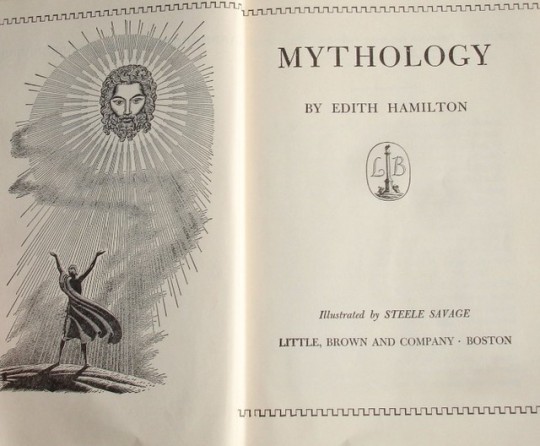
Adult Home Study for Hellenic and Roman Polytheists
How do we know what we know about the gods? Much of our knowledge comes from mythology: ancient tales about the gods, fantastic creatures, heroes, and mortals.
There is another meaning of the word “myth”: “widely held, but false, ideas or beliefs,” and all too many of the readily available sources of information about mythology fit that definition. A vast majority of the general population discovers Greek and Roman mythology from motion pictures, video games, and general texts like D'Aulaires Book of Greek Myths and Edith Hamilton’s Mythology. A few more have read Homer’s Iliad and Odyssey, Virgil’s Aeneid, Ovid’s Metamorphosis, and Apuleius’ Golden Ass.
Yet more scholarly, in-depth resources are available to polytheists who want to learn about mythology. The fields of history, archaeology, anthropology, religion, literary criticism, art history and psychology all look at mythology from different perspectives.
History examines how the myths were composed, who told or wrote them, and what people said about them.
Archaeology identifies mythological motifs found on objects and structures, and tries to determine their meaning to those who viewed and used them.
Anthropology seeks to understand the cultural reasons for the creation and transmission of myths, and the relation of myth to rituals such as rites of passage such as the transition to adulthood, marriage, and death.
Religion regards myths as sacred stories that explain the creation of the universe, and teach moral truths, and seeks to understand the relationship between mythology, belief, and ritual.
Literary criticism investigates the sources of myths, the oral art of storytelling, motifs and themes, the composition of texts, style, meaning, and comparison of different versions.
Art history focuses on images from mythology throughout history, the religious and symbolic meanings, and artistic techniques.
Psychology delves into the myths as archetypes and symbols, expressions of the collective unconscious, or as a symbolic language to help individuals find meaning and negotiate challenges.
You’ll notice there’s some overlap between these fields. And you should remember that scholars don’t talk to people outside their fields as much as they should.
Many people are initially drawn to the gods after viewing a work of art or reading a story. Some of us have an experience in nature, or in an altered state of consciousness. Becoming aware of a deity is known as an ephipany or personal gnosis, a subjective perception or experience of the presence of the divine. It can be a feeling that a place is sacred, a sense that there is a greater power than ourselves in the universe, or a realization that a higher power has brought about a particular situation.
So, how we know what we know about the gods is…complicated. To really know something, one must regard it from different angles, and take time to understand it. Taken altogether, it’s fairly obvious that each of us necessarily has a different interpretation of mythology, depending on our personal study and experiences.
Unfortunately, many Hellenic and Roman and polytheists have only read the basic mythology titles listed above in their study of the gods. A few more have read books on devotional practice, but most of us haven’t gone much further in our studies. And, because the sources we’ve read just scratch the surface of available knowledge about the gods, our understanding is so superficial that many of us lack the vocabulary to describe our beliefs, and may even harbor misconceptions about one or more gods that harms our relationship with them. Not only does this impede our spiritual progress, but it makes it difficult to talk about our religion to another person. “I worship the gods of the ancient Greeks,” really tells them nothing, except that one is a polytheist.
Since you’re reading this, I assume your religion is an important part of your life, and, if so, your understanding of it deserves to be developed to the best of your ability. I realize not everyone is interested in or has the temperament for research, and that books can be expensive and difficult to obtain. However, most libraries have sections on the fields above, quite a lot of solid information is available online, and it can be done in easy-to-digest bites.
Here are some ideas for study that can help to enrich your understanding and interpretation of mythology:
Read about a Mystery cult, a hero cult, the cult of the nymphs, the Roman Imperial cult or the deified personifications of the virtues in ancient Greece and Rome.
Visit a museum and learn about the archaeology of the regions in which your deities were historically worshiped.
Learn the names and significant events of the different time periods in the ancient Mediterranean. How did agriculture, literacy, mathematics and theater affect society and religion?
Mark the locations of temples dedicated to one of your deities on a map. Are they focused in one area, or are they widespread? What conclusions can you make based on this information?
Read the Orphic hymn(s) about a deity to whom you feel little connection, and read a list of their epithets and cult titles. Think about whether the deity seems more approachable, or just as inaccessible.
Study a work of mythological art. What does it tell you about the meaning of the subject in the era in which it was created?
Read an article on Hellenic or Roman mythology from the viewpoint of of a modern monotheistic or polytheistic religion.
Learn a bit about C.G. Jung’s psychological theories and use of mythic symbols, or Joseph Campbell’s monomyth.
Choose a favorite myth and see how many different versions you can find. Are the versions from different times, different places? Do they have similar or different meanings?
Learn some of the terms used by scholars to describe key concepts in the study of religion. Which of the concepts applies to your own beliefs and practice?
Prepare a meal from an ancient recipe using ingredients that were available in antiquity.
Find out what the ancient philosophers and critics thought about an epic poem or drama.
Select an art or skill favored by one of your gods, study it, and try applying in your own life. For instance, you could dedicate a study of strategy in honor of Minerva and apply one of the techniques to help win a game, or learn a little about weaving to make a wall hanging to honor Athena.
Choose an ancient war. What issue(s) led to conflict? How was it resolved? What were the chief deities of each side? Did religion, omens, or religious rites play any part in the warfare? Were there heroes of the war? Were legends told about them? Were they given offerings such as a monument or hero-shrine?
The more one studies, the more one can deepen their relationship with their deities, the more clearly one may be able to explain their religion to others, and the better equipped one may become to counter criticism of their beliefs.
1K notes
·
View notes
Photo
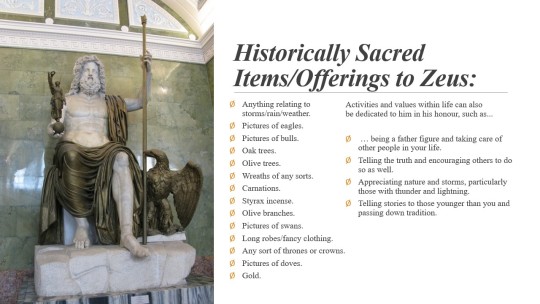
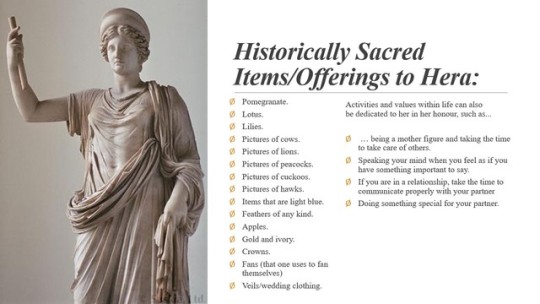
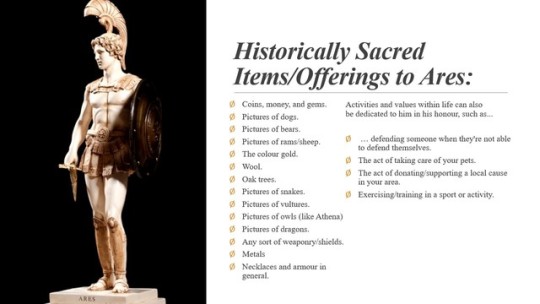
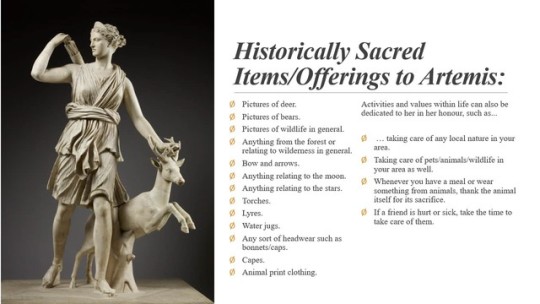
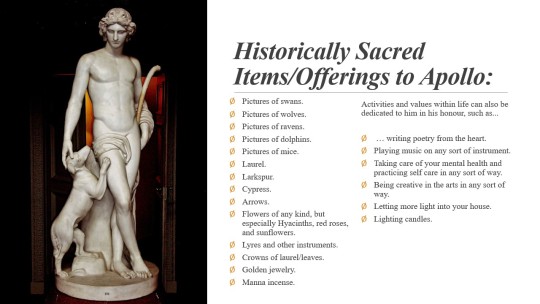
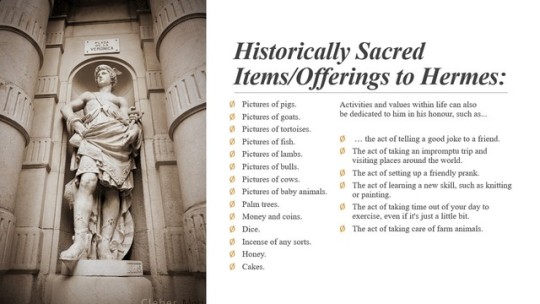

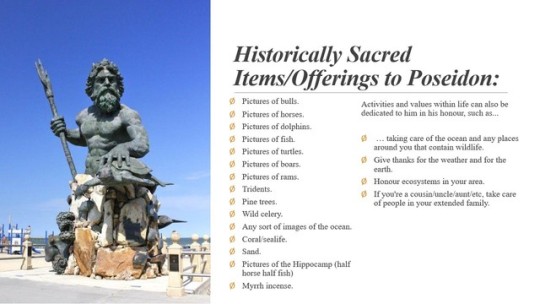
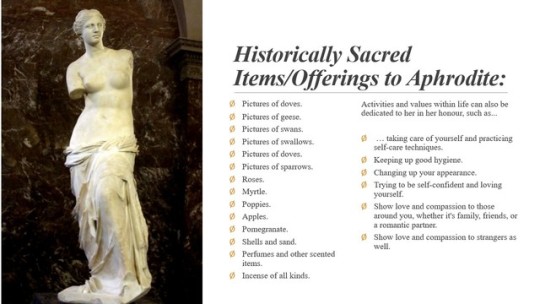

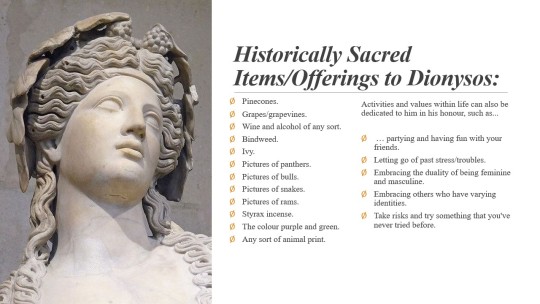
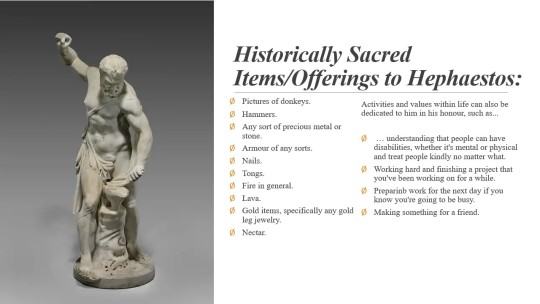
Historically Sacred Items/Offerings to each of the Ouranic Theoi! I made this for my Hellenic polytheism group on discord, so I thought I’d share this information with all of you as well.
All information has been taken from theoi.com as well as various historical books on the gods, and I have decided to make this powerpoint so that other people don’t have to sift through all the pdfs and books themselves.
Make sure to click each image to get a fullview! Ευχαριστώ!
16K notes
·
View notes
Text
Person: It’s just a book!

This is the most accurate thing I have ever seen in my entire life.
8K notes
·
View notes
Text
parents spend the first 18 years scaring their kids into not getting pregnant, and the next 20 wondering why they wont
4K notes
·
View notes
Text
When a predator kills pregnant prey it’s the animal kingdom version of getting a free nugget in your fast food bag
2K notes
·
View notes
Text
One of INTP’s worst nightmares is crying in public.
555 notes
·
View notes
Text
if the lottery announced how many people lost instead of how much was won, fewer people would take part
1K notes
·
View notes









